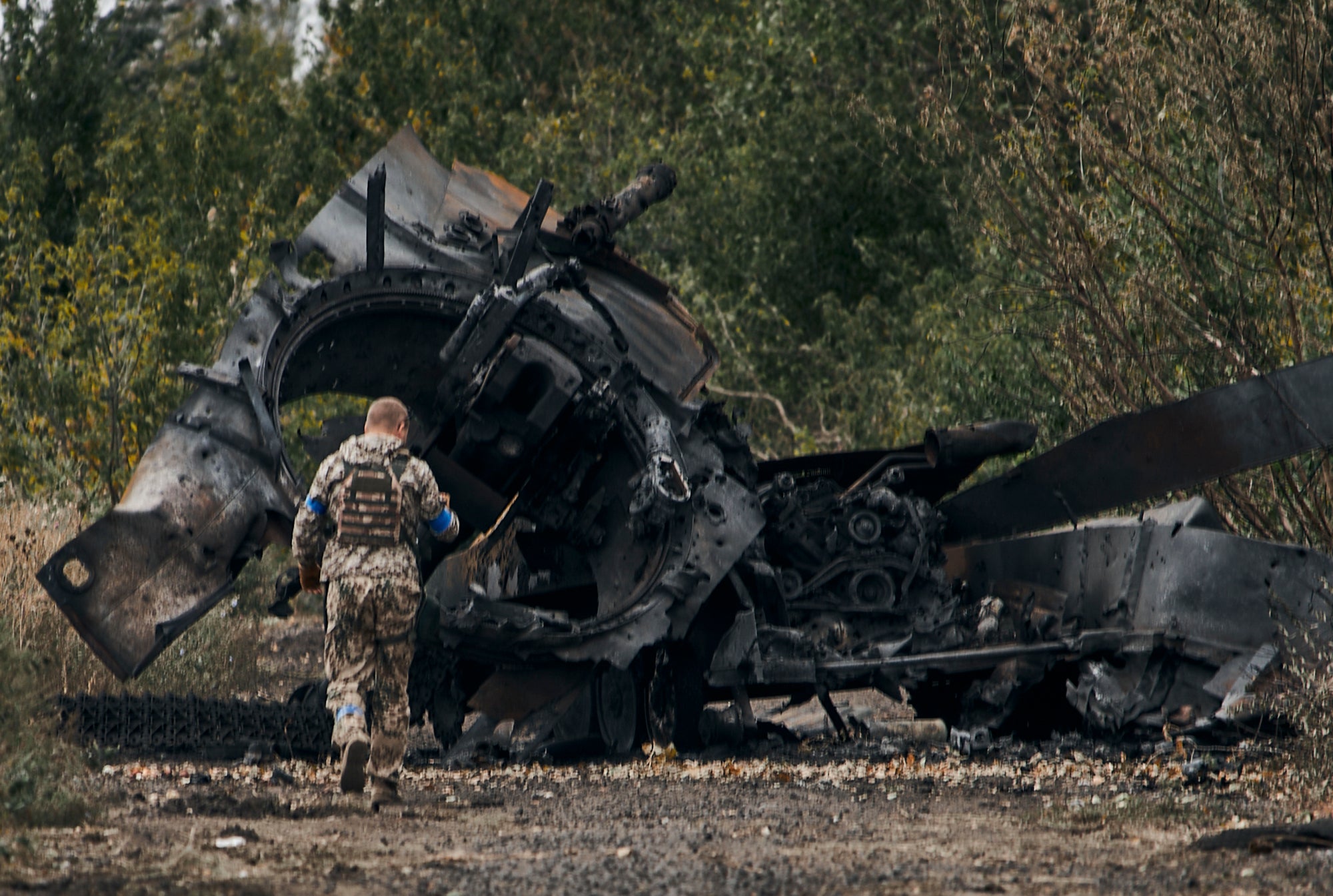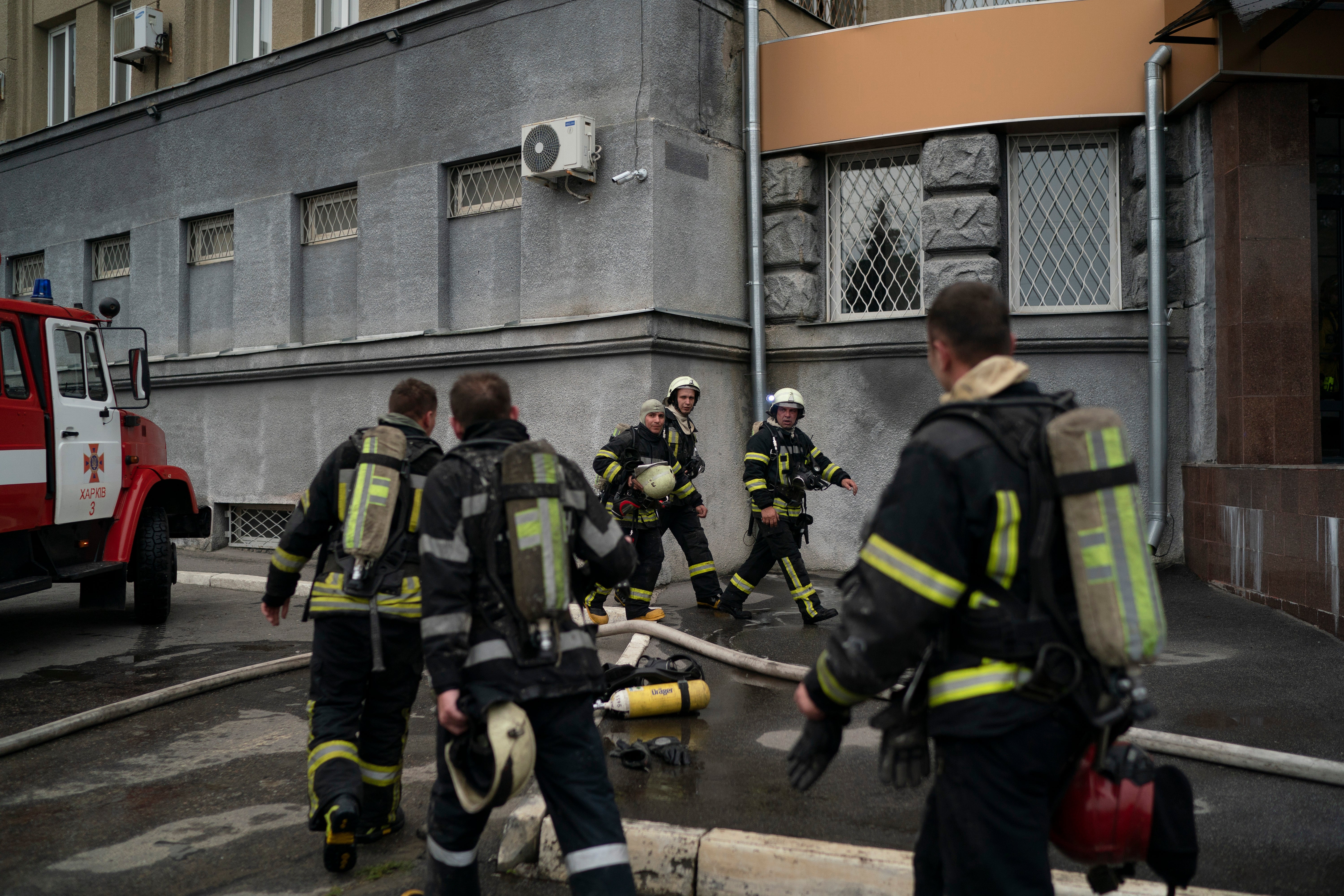
Ukraine forces continued to push forwards and recapture invaded territory – even reaching the Russian border in one area – officials said on Monday, as criticism of the war grew louder in Russia.
Blue-and-yellow Ukrainian flags fluttered over newly liberated towns in the northeast of the country with Kyiv claiming its troops had freed more than 20 settlements in 24 hours. Russia acknowledged it was abandoning Izium, its main stronghold in the area.
As the seven-month-long war entered a seemingly critical phase, Russian forces responded by attacking power stations and other critical infrastructure in Kharkiv, plunging thousands of people in cities and towns into darkness.
Ukraine’s president Volodymyr Zelensky said Moscow’s “deliberate and cynical” targeting of civilians – a charge always denied by Moscow – was an act of terrorism.
“Do you still think you can intimidate, break us, force us to make concessions?” Mr Zelensky said. “Cold, hunger, darkness and thirst for us are not as scary and deadly as your ‘friendship’ and ‘brotherhood’.”
He added: “We will be with gas, lights, water and food, and without you!”
Ihor Terekhov, the mayor of Kharkiv, accused Russia of shelling densely populated areas.
The impact of the rapid and dramatic advance by Ukrainian forces was also felt in Moscow, where there was rare criticism of the Russian military and political leaders, including president Vladimir Putin.
In recent days, Kyiv’s forces have captured territory at least twice the size of greater London, according to British defence officials. Ukrainian forces outnumbered Russians by eight to one in the counterattack, Moscow said.
After months of little discernible movement on the battlefield, the momentum has noticeably lifted Ukrainian morale.
“In some areas of the front, our defenders reached the state border with the Russian Federation,” said Oleh Synyehubov, governor of the northeastern Kharkiv region.
Over the weekend, Russia said troops would be pulled from areas in that region to regroup in the eastern region of Donetsk.
There were reports of chaos as Russian troops abruptly pulled out.
“The Russians were here in the morning. Then at noon, they suddenly started shouting wildly and began to run away, charging off in tanks and armoured vehicles,” Dmytro Hrushchenko, a resident of recently liberated Zaliznychne, said.
“People are crying, people are joyful, of course. How could they not be joyful,” said retired English teacher Zoya, 76, north of Kharkiv in the village of Zolochiv, weeping as she described the months she had spent sheltering.

Nastya, 28, had fled the village in April but returned last week after news of Ukrainian advances: “I think everyone’s in a great mood! It’s all over now. At least we hope it’s all over.”
Video taken by the Ukrainian military showed soldiers raising the Ukrainian flag over battle-damaged buildings. In one scene, a fighter wiped his boots on a Russian flag on the ground.
Russian officials said it had stopped sending new units into Ukraine.
However, Moscow’s bombardment of Kharkiv ignited a massive fire at a power station on the western outskirts of the city, killing at least one person and leaving Ukraine’s second-largest city without power.
Several areas were hit with widespread blackouts and cuts in water supply due to Russian attacks on infrastructure sites, the region’s governor said.

“The [Russian] occupiers have struck critical infrastructure in the city and region of Kharkiv,” Mr Synyehubov wrote on Telegram.
The head of the eastern Sumy region, Dmytro Zhyvytskyy, said cuts to electricity and water supplies had impacted at least 135 towns and villages.
Ukraine’s gains caused political ripples in Moscow. Some Russian officials took the brave step of publicly calling for Vladimir Putin’s resignation. District councils in the leader’s home city of St Petersburg were among those urging the country to oust the 69-year-old.
Deputies from the Smolninsky District issued a statement calling for him to be tried for treason. Dmitry Palyuga, one of the councillors, tweeted that the motion was supported by most of the district’s deputies.
“We believe that the decision made by President Putin to start the special military operation is detrimental to the security of Russia and its citizens,” he said.
Criticism of Putin also aired on TV. In a rare show of defiance, Boris Nadezhdin, a former liberal politician, told a Gazprom-owned channel that Mr Putin had been misled into thinking Ukraine would capitulate if he invaded.
“We are now at the point where we have to understand that it’s absolutely impossible to defeat Ukraine using those resources and colonial methods with which Russia is trying to wage war,” he said.
Ramzan Kadyrov, the Moscow-backed leader of the Russian region of Chechnya, publicly criticised the Russian Defence Ministry for what he called “mistakes” that made the Ukrainian blitz possible.
The Kremlin though remained defiant, claiming it would achieve all of its aims in Ukraine, despite Ukraine’s military gains.
In Moscow’s first public comments since Ukraine forces successfully pushed back Russian forces in the Kharkiv region, Kremlin spokesman Dmitry Peskov said: “The military operation continues. And it will continue until the goals that were originally set are achieved.”

It is not yet clear if the Ukrainian blitz could signal a turning point in the war, although some analysts cautioned that fighting would likely go on for months.







